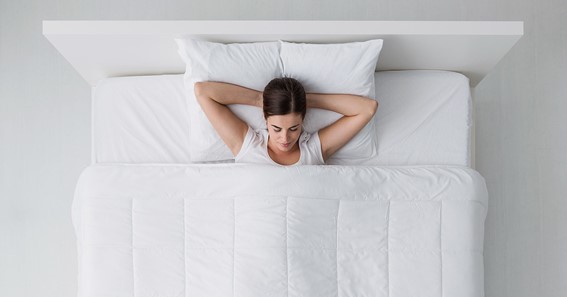However, it is one of the most comfortable positions for deep sleep. When you lie on your back, you keep your neck and spine in a neutral position, preventing pressure from building up on your neck and spine during sleep. Also, sleeping on your back promotes restful sleep. The following are a few benefits of sleeping on your stomach.
The position mimics that of a standing position. It also helps the body maintain its natural curve. If you sleep on your side or stomach, your spine may get twisted and may aggravate your condition. According to a 2017 study, sleeping on your back is the best posture for preventing pain and maintaining proper spinal alignment. This position reduces pressure on the head, neck, and back. This is also helpful in preventing heartburn.
What Are The Benefits Of Sleeping On Your Back
Lesser Pressure On The Head And Neck
Many people have heard about the benefits of sleeping on your back. A 2017 study has found that this is the best way to prevent pain. This position also allows for less pressure on the head and neck. It helps prevent the appearance of wrinkles and keeps the skin supple and smooth. The lack of pressure on the face and neck helps prevent premature wrinkling. Combining this with a moisturizer will further minimize the effects of gravity on the skin. You also need to learn the steps of making a bed.
Click here – Should I buy extended warranty for a Volkswagon beetle?
Keeps Spine In Neutral Position
The benefits of sleeping on your back are numerous. For one, it keeps the spine, head, and neck in a neutral position. As a result, the pressure on the spine is reduced. It also helps reduce the incidence of heartburn and acid reflux since sleeping on your back elevates the esophagus above the stomach. Moreover, sleeping on your side can also relieve muscle tension. In short, sleeping on your back can improve the quality of your sleep and your life in general.
Can Fight Sinus Congestion
Sleeping on your back can help you fight off sinus congestion. By keeping your face away from your pillowcase, you can help your sinuses drain and stay clear. Furthermore, you can use bricks on the headboard side to help you sleep on your back. Additionally, you can place standard-sized bricks beneath the headboard side of the bed to help support your head and neck. Besides, sleeping on your own back can also reduce tension headaches, a common condition that can be prevented by sleeping on your own.
Can Help With Snoring
Sleeping on your back can help with snoring, a common problem that affects many people. Although sleeping on your back may be uncomfortable, it’s better than sleeping on your side. The benefits of this position include:
- Reducing the risk of heartburn.
- Helping to keep your skin young.
- Preventing apnea.
The benefits of sleeping on your back are many, but it’s not the right position for everyone.
Can Help You Sleep Soundly
Sleeping on your back can help you sleep soundly. It helps to prevent snoring and is beneficial for your spine. Your back is the most natural position for sleeping. While people have trouble sleeping on their backs, most people can’t sleep on their sides. They need to sleep on their sides, which is uncomfortable and causes acid reflux. They may have a problem with their spines.
Relieves Pressure On The Sinus
Research shows that the position you sleep indirectly affects your health. While it may not be the most popular choice, back sleeping has many benefits. It relieves the pressure on your sinuses and helps you sleep better in the morning. It’s a little uncomfortable for some people, but it’s the best position for sleeping for most of us. It’s a little awkward when you’re used to sleeping on your side. If you have a hard time adjusting to a back sleeper, you can use a training pillow and start feeling more comfortable.
Train Yourself In The Best Way To Sleep On The Back
If you have trouble sleeping on your back, it’s time to change that habit. Here are some tips for people as a back sleeper. It’s important to remember that you’ll need some practice before you’re completely comfortable in this position. Ensure your pillows are at the right height and your mattress is firm enough. Depending on your personal preference, you may need to purchase a weighted blanket or pillow to maintain your position.
Get A Training Pillow
If you’re uncomfortable sleeping on your back, you can buy a training pillow that will force you to sleep on your back. The pillow should be soft and comfortable, and it should be placed underneath your head to keep you from rolling over. Another helpful accessory is an adjustable bed. These pillows can help you raise your upper body while you sleep. This will reduce your body’s urge to roll over, and it will prevent you from having a stiff neck and back in the morning.
Start With Sleeping On The Back
If you want to sleep on your back, try sleeping on your side first. If you find that you prefer sleeping on your side, it’s probably time to try a training pillow to force yourself into this new position. This will help you feel more comfortable when you wake up and improve your overall health. But, if the benefits do not convince you of sleeping on your back, you may want to try this method.
In Conclusion
While sleeping on your back is the most comfortable position for most people, it is not recommended for those with neck pain or other issues. Even if you sleep on your side, keep in mind that it is not recommended to keep your head in an elevated position while sleeping. The same is true if you sleep on your back. It is better to avoid sleeping in this position if you suffer from this type of pain. However, if you must, make sure you don’t eat any heavy meals before you go to bed. Besides that, you should not consume any caffeine or alcohol at least two hours before you go to bed.
Click here – Can cats eat bread? What you need to know!
To Know Some Great Stuff Do Visit FilmyViral
To Know Some Great Stuff Do Visit FinanceNInsurance
To Know Some Great Stuff Do Visit FindingCEO



